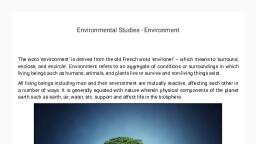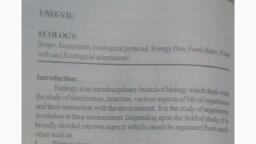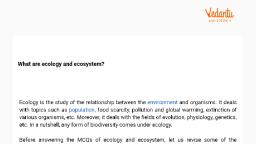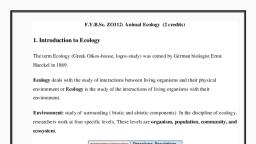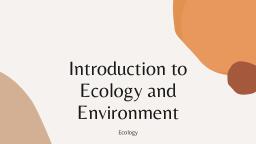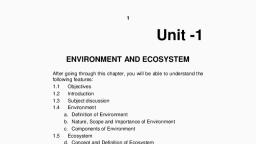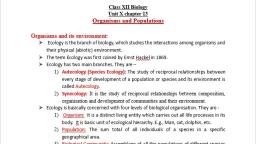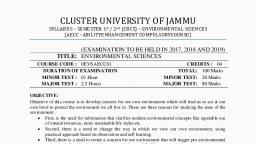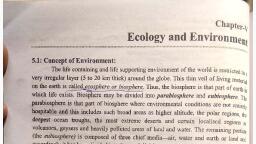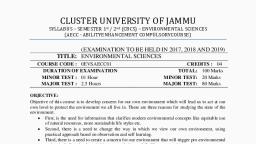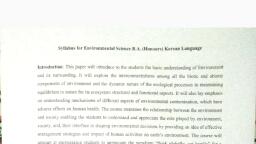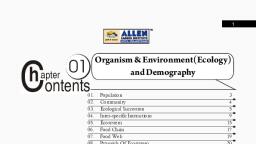Page 1 :
Scanned with CamScanner, Content, 1.1 - 1.1, CHAPTER, 1. Introduction to Ecology, INTRODUCTION TO ECOLOGY, 1.1 Concept of Ecology, 1.2 Environment, 2. Ecosystems, 2.1 - 2.46, 1.2.1 Multidisciplinary Nature of Environmental Studies, 1.2.2 Scope of Environmental Studies, 1.2.3 Importance, 1.3 Papulation, 1.4 Community, 1.5 Ecosystem, 3. Population, 1.6 Biosphere, 3.1 -3.22, 1.7 Subdivisions of Ecology, Exercise, 1.1 CONCEPT OF ECOLOGY, Ecology is one of the important branches of science which is also, called as Environmental Biology. This is one of the young branches which, is connected with the organisms and their environment. The name, ECOLOGY is derived from two Greek words i.e. Oikos = House and Logos, Study. Therefore, the studies of inter-relationships of organisms with, their physical and biotic environment can be called as Ecology., 4. Community, 4.1 - 4.12, E. P. Odum (1963) defined Ecology as structure and function of, nature., 5. Animal Interactions, Earnst Haeckel (1866) defined Ecology as a branch of science which, deals with the total relationships of organisms to both their organic and, inorganic environment., 5.1 - 5,14, ***, (1.1)
Page 2 :
Scanned with CamScanner, reproduction etc. of an are by the environmental, and of organic of a given area upon, factors like Soil, in the soil etc. with, these factors the with each Structure, Introduction to Ecology, F.Y.B.Sc. Zoology (P-II), 1.2, 1.3, Introduction to Ecology, F.Y.B.Sc. Zoology (P-II), The structure, growth,, (2) Population Ecology or Demecology: Study of populations of, different species of a ecosystem concerning their birth rate, death, rate and the different factors affecting their growth in size and, number called as population ecology., environment., All organisms live in, (3) Ecosystem Ecology: Deals with analysis of ecosystem in relation, to structure and function, the interrelationships of components of, ecosystem. The reciprocal relationships of living and non-living, components of ecosystem are studied in detail in this branch., environmental and biotic factors which are present in that area,, In the early days, ecologists used to separate study of ecology into, plant ecology and animal ecology just like biology. However, modern, ecologists feel that as the environment which govern the life of plants, and the animals is the same. Both the branches of ecology i.e. animal, ecology and plant ecology must be unified and studied as a whole, Broadly, ecology can, (ii) Synecology. Autecology is a branch of ecology in which we study an, individual species or its population in relation to its biotic (living) and, abiotic (non-living) environment. In this branch, one will study a species, of organism or its population throughout its life, its interactions with the, environment and among themselves. For example: In a forest, if we study, the population of a rat or rat species, its increase in number, food taken, by it, its relation to plants and other animals living in that locality, its birth, rate, death rate and their interactions within their own population it is, autecological study., Synecology is a branch of ecology which deals with the structure,, number, development, distribution and interactions of organic, community of a locality with the environment and amongst themselves as, a whole. For the synecological study, the autecological knowledge of, individual species is necessary. Thus, autecological studies are necessaly, to understand the synecology of a given community. If we study the, different plants and animals living in a forest and their interrelationsnips, with the environment and among themselves called a synecology, forest., (4) Conservation Ecology: On the planet earth, the different raw, materials like coal, water, oil, minerals etc. which are required for, the welfare of man are limited. They must be properly used, if, they are misused future or man's life will be in danger. To avoid, the difficulties for the future generations we have to plan the, be divided into: (i) Autecology and, utilization of the resources properly. In this branch of ecology, we, study the proper management methods of natural resources like, land, water, forest, sea, oil, minerals etc. for the benefit of the, human beings., (5) Production Ecology: This branch deals with the gross or net, production of different ecosystems, like freshwater ecosystem,, marine (sea) 'ecosystem, agriculture, horticulture and proper, methods of management of these ecosystems so that maximum, production can be achieved by human-being., (6) Radiation Ecology: In this branch, we study the effects of, radiation and radioactive substances, uo, organisms and, environment. In recent years, man is establishing a number of, nuclear reactors to get more and more energy for his factories, etc. This is leading to side effects and accumulation of dangerous, radioacitve waste in large proportions. If this is not properly, managed the existence of human race will be in danger., Radiation ecology studies help us to understand the problems, and possible remedies for the same., position, ecology can be subdivided into many branches. Some of te, important divisions are as given below:, (7) Paleoecology: With the help of fossil studies (Palaentological) we, can have idea about the nature and structure of the organisms, living in the geological past. In this branch of ecology, we study, about the different forms living in different times in the past and, ecology, Desert ecollogy etc.
Page 3 :
Scanned with CamScanner, 1.4, F.Y.B.Sc. Zoology (P-II), F.Y.B.Sc. Zoology (P-II), 1.5, Introduction to Ecology, An Ecologist must have a knowledge of uses of pesticides, detergents,, sewage disposal, power dams, urban development, atomic'radiations etc., to understand the ecological problems., In recent days, man for his own needs started changing the natural, communities thinking that it will result in giving better life for human, beings. Expecting major benefits man changed the environment, but this, many times created more problems than it solve. Thus, unplanned (with, half knowledge) changes brought about by man resulted in Ecological, Boomerangs or Ecological Backlashes. Few examples will make it clear, that how the ecological boomerangs resulted due to the unplanned, interference of man in nature., life forms and the environment changed from time to time due, future changes which we may try to bring in nature to suit the, betterment of human life., (8) Gene Ecology or Ecological Genetics: In nature, we find that, particular species of a genera are having capacity to survive and, other fail to live and become extinct. This has been found to be, due to the presence of particular genes present in these surviving, species. At the same time we find that some species have a sort, of genetic plasticity more than the other species. This helps them, in struggle for existence. In gene ecology, we study the, relationship of genes and their adaptability in nature., (9) Space Ecology: This is one of the most modern and latest, branches of ecology. Man is trying to reach other planets which, are located far away from earth. For this he has to travel millions, of kilometres for a number of days. In this branch of ecology,, construction and usage of partial or complete regenerating, systems in space ships and effects of space travel on the, organisms are studied., (1) In our own country the thick forest were cut down to meet the, needs of agriculture, timber, fuel, food for cattle etc. Thus, the, clearing of forests increase the agricultural land to increase the, food needed for our ever increasing population. But this, deforestation resulted in constant floods of major rivers and soil, erosion in the low areas. Thus, every year country is losing, property worth of some crores and human lives due to the, floods., (2) Industrial expansion in almost all countries with a view to benefit, the population has resulted in many problems like air and water, pollution, increase in the urban population formation of slum, areas causing social unrest and health problems., If we study closely the civilized man's actions which are aimed for, benefit of man have resulted in creating problems which he can not solve., So it is essential for every country and man to think and study closely the, ecological aspects of the natural communities before trying to change the, natural systems. Unless we are sure about the after effects and results we, must not play with the natural ecosystems if not the existence of man, (10) Taxonomic Ecology: This branch of ecology is connected with, different taxonomic groups. This branch can be subdivided into, many branches viz. Plant ecology, Animal ecology, Microbial, ecology, Vertebrate ecology etc., (11) Human Ecology: This branch deals with mainly the relationship, between man and his environment., Scope and Significance of Ecology:, itself may be in danger., 1.2 ENVIRONMENT, Ecology is a complex branch of biology which is related to almost an, Environment is the sum total of the surrounding external conditions, Anatomy Tav y, Microbiology, Mathematics, Statistics, Morphology. influencing the growth and development of animals and plants. There are, Taxonomy, Cytology, Genetics, Physiology, Biochemistry etes,, several definitions of environmental science given by different experts in, the field of environment., "Environmental science provides an approach towards understanding, the environment of our planet and the impact of human life upon the, - J. Turk, ecological problems., environment",
Page 4 :
Scanned with CamScanner, those can on earth their, "Environmental science is the of ecosystems, Introduction to Ecology, F.Y.B.Sc. Zoology (P-II), Introduction to Ecology, F.Y.B.Sc. Zoology (P-II), Environmental studies is not only related to natural science but also, related to social sciences like Economics, Sociology, Civics, History,, Politics etc. Thus, environmental studies interact directly or indirectly with, human's social, mental, economic, political and cultural aspects and hence, - Bernard Nebel, equilibrium"., "Study of inter-relationships between living and non-living things i, called environmenta! science"., "Environmental science refers to the sum total of conditions which, - D. Chivas, study of social sciences is essential., - C. C. Park, surround man at a given point in space and time"., "Environmental science may be defined as the systematic study of, surrounding factors that affect life on earth in the context of human, Following brief description gives an idea of multidisciplinary nature of, the environmental studies:, 1., Biology and Environmental Studies: Biology deals with the, study of living organisms like plants, animals, microorganisms,, fungi, bacteria, viruses etc. and they all are related to, environment. Their life cycles, ecosystems, food chain, energy, 1.2.1 Multidisciplinary Nature of Environmental Studies, Environmental Science is very vast and multidisciplinary subject. In, this subject, we basically study interrelation between biotic (living) and, abiotic (non-living) components or factors. When we study living, órganisms ultimately we have to study the subjects like Biology, Botany,, Zoology, Physiology. Biochemistry, Biophysics, Chemistry, Mathematics,, Statistics, Computer Science, Anthropology etc. The non-living or abiotic, components include soil, air, water, energy, light etc. are closely related to, Geography, Geology, Geophysics, Meterology and all these subjects, belong to the major field of earth sciences. They provide vital information, about the non-living components of environment called lithosphere,, hydrosphere and atmosphere. Biosphere is the component of the, environment formed by earth and atmosphere in which many smaller, ecosystems exists and operates. Thus, life is sustained in biosphere. In, environmental studies, we study natural sciences., existence"., transfer, their conservation etc. are studied in this subject., 2., Botany and Environmental Studies: Botany deals with study of, plants present on the earth. Variety of plants and fungi are, available on earth. 33% land is covered by plants and plants play, important role in precipitation, control of floods., Deforestation results in desertification. All these things are, studied in environmental studies., 3., Zoology and Environmental Studies: Animal life is vast on the, earth, and they play an important role in food chain. Their, behaviour, habitat and importance in environment are studied in, this subject., Biology Botany, Physics and Environmental Studies: Physics deals with energy,, 4., Anthropology,, Sociology., types of energy, conventional and non-conventional energy,, energy crisis etc. How ecofriendly energy production can be, Zoology, Psychology-, Physiology, done is studied., Politics-, Chemistry and Environmental Studies: Chemistry deals with, study of different types of chemicals, chemical reactions,, hazardous and toxic chemicals. Toxic chemicals and gases in air, (i.e, pollution) are harmful to environment and living organisms., How global warming problem is raised by more and more, emission of CO2 All these chemicals and their ill effects are, Environemental, studies, Chemistry, 5,, History-, Physics, Economics, Mathematics/geometry, Metrology, Statistics, Geology Geography, Fig. 1.1: Multidisciplinary Nature, studied in this
Page 5 :
Scanned with CamScanner, 1.8, F.Y.B.Sc. Zoology (P-II), Mathematics, and Environmental, 1.2.2 Scope of Environmental Studies, 6., Studies: Ever increasing population of world, urbanization and, industrialization, have created many environmental probleme, and they are studied with the help of maths and statistics., Environmental study is multidimensional, interdisciplinary and, multidisciplinary subject, hence it is related with natural and social, sciences. Day-by-day, this science is expanding. If we look around at the, area in which we live, we see that our surroundings are originally a, natural landscape such as a forest, a river, a mountain, a desert or, combination of these elements. But now what picture we are observing?, Civics and Environmental Studies: There are many rights given, 7., to man by constitution. As a civilized person there are also some, duties of man. For better and healthy environment every person, should undertake tree plantation, conserve water and energy, One should keep our surroundings clean. If we keep our rivers., lakes and seas clean and protect them, then and only then we, can protect our environment. These are our prime duties. These, things we study in civics., Most of us live in landscapes that have been heavily modified by human, beings. These modifications are seen in villages, towns and cities. Human, life is totally depending on environment. We cannot separate our life, from environment. Our several needs are fulfilled from environment., 8. History and Environmental Studies: We can study and, compare the environment of present and ancient time. We can, also study the wars and their impact on environment and, humans. During Gulf war how aquatic and arial environment was, deterioted and how it affected humans and aquatic animals. can, be studied with the help of history., Those who are living in cities get their food supply from surrounding, villages. We are dependent on forests, grasslands, rivers, sea shores for, resources such as water for agriculture, wood for fuel, fodder and fish., Thus, our daily lives are linked with our surroundings and inevitably, affects them. We use water to drink and for day-to-day activities. We, breathe air, we use resources from which food is made and we depend, on the community of plants and animals which form web of life, of which, we are also a part. So many things we get from our environment. Water,, air, wood, minerals we get from environment. Everything around us forms, our environment and our lives depend on keeping its vital systems as, intact as possible., 9., Economic and Environmental Studies: Human needs and, limited resources are balanced in Economics. Due to increasing, population and unsustainable use of natural resources many, problems are created in human life. These problems are studied, in environmental studies., Our dependence on environment is so great that we cannot continue, to live without protecting earth's environmental resources. Therefore, we, 10. Politics and Environmental Studies: The government of every, country prepare the policies for the development. More, emphasis is given on economic and industrial growth, but there, is always loss of natural resources. Problems like pollution are, invited. How these problems can be solved and progress can be, made. This can be studied and remedies can be suggested in the, study of environmental studies., 11. Geography and Environmental Studies: We study several, environment related factors in geography. Geography a, environmental studies are very closely related subjects. Inter, relation between man and environment is very well studied, the subject geography., always refer our environment as 'Mother Nature' and most traditional, societies have learned that respecting nature is vital for their livelihoods.,, Therefore, many traditional societies protect and preserve their natural, resources. Respect for nature and all living creatures is not new to India., In our Indian culture, we worship many trees, animals and rivers. All our, traditions are based on these valueş. Emperor Ashoka also declared that, all forms of life are important for our well being in fourth century B.C., The modern societies with the help of science and technology and, technological innovations are producing more resources. For example, we



